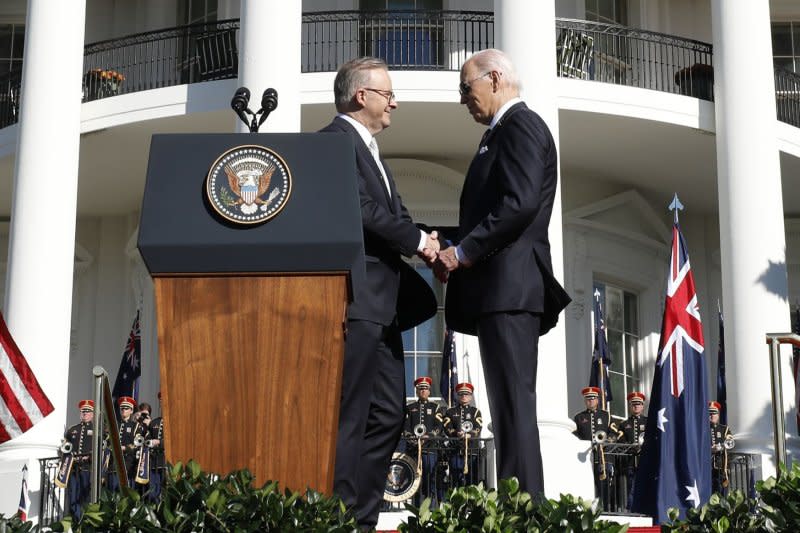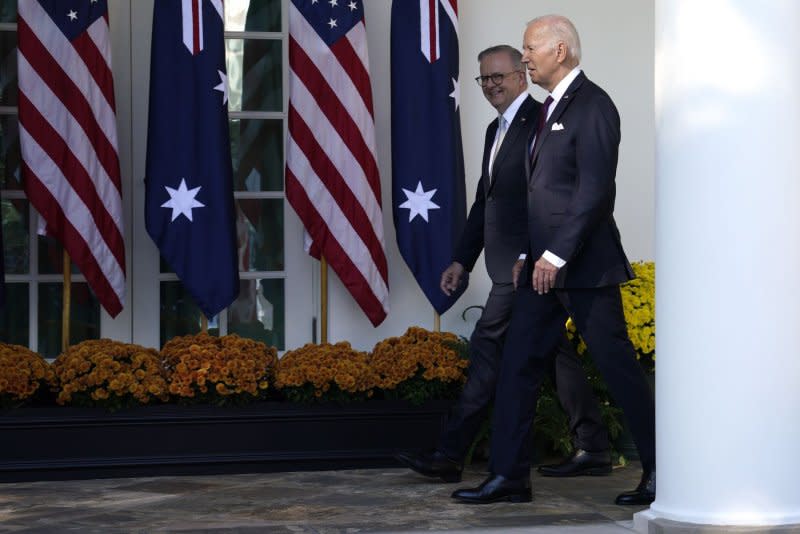Israel, Ukraine conflicts garner attention as Australia PM visits Washington

- Oops!Something went wrong.Please try again later.
- Oops!Something went wrong.Please try again later.
- Oops!Something went wrong.Please try again later.
Oct. 25 (UPI) -- On a day in which President Joe Biden welcomed Australia's Prime Minister Anthony Albanese to the White House to reconfirm U.S.-Australia strategic partnerships, the ongoing Israeli offensive against Hamas in Gaza also was a key topic.
Biden began his joint press conference with Albanese on Wednesday by saying Israel has the right to defend itself against Hamas, but must "do everything in its power to protect civilians."
Biden also said, "I continue to be alarmed by extremists settlers attacking Palestinians in the West Bank."
Asked by a reporter if Israel was ignoring Biden's concern about protecting civilians with thousands of Gaza civilians killed by Israeli bombing, Biden said that, while civilians are being killed, he doesn't trust the numbers of casualties reported by the Hamas-controlled health officials in Gaza.
He said it is despicable and cowardly that Hamas is hiding behind civilians.

Biden said the United States is working around the clock to secure the release of hostages taken by Hamas and to facilitate the safe passage of foreign nationals out of Gaza.
"We also have to remember Hamas does not represent the vast majority of the Palestinian people in the Gaza strip or anywhere else," Biden said.

He said the Middle East future the United States seeks is a two-state solution and that requires a concentrated effort by both Israel and the Palestinians.
When asked if Americans should be concerned about escalation of the Israel-Hamas war due to 24 U.S. troops being inured by Iran-backed militia attacks, Biden said he has warned Iran.

"My warning to the ayatollah was that if those troops continue to be attacked he should be prepared for us to respond," Biden said.
Turning from the chaos in Gaza, Biden said U.S-Australian cooperation on a number of fronts is strengthening the alliance the two nations share.
"We're accelerating action on climate change, a very good meeting this morning on that," Biden said.
He said the two nations are pioneering new innovations in advancements such as batteries, quantum computers, security and more.
Biden said a new AI initiative between U.S. and Australian national laboratories is helping drive on some of humanity's biggest challenges, such as curing cancer.
Citing another global hot spot, Biden said the U.S. and Australia are unwavering in their support for Ukraine. And he said the two nations are working together in a shared commitment to uphold freedom of navigation in the Indo-Pacific region, too.
Indo-Pacific challenges carry consequences, the president said.
Biden expressed concern over Chinese ships harassing Philippines vessels and warned China, saying that, "The U.S. defense commitment to the Philippines is ironclad. Any attack on Filipino armed forces or vessels will invoke our mutual defense treaty with the Philippines."
Albanese said the United States and Australia have a strong partnership and are working together on climate, clean energy, and critical minerals supply chain support.
"I regard the United States as a very reliable partner," Albanese said. "It's a relationship of trust."
He said he is confident that Congress will pass the AUKUS defense deal, an agreement between the United States, Britain and Australia.
On the Middle East Albanese said Australia "unequivocally condemns the terror of Hamas" and added "respect for international humanitarian law is paramount."
Albanese announced $10 million more in Gaza civilian humanitarian relief in addition to the $10 million it has already provided.
Biden and Albanese were planning to use the daylong discussions durign this state visit at the White House to reaffirm their partnership amid growing tensions in Southeast Asia, and to outline several new global initiatives that would serve to strengthen the alliance.
The talks come as the international community has been unsuccessful in deescalating the Middle East conflict after nearly three weeks without a ceasefire, with both leaders saying they were increasingly committed to protecting human rights in Gaza and the West Bank amid the hostilities and a simultaneous hostage crisis.
Previously, Biden and Albanese condemned the Oct. 7 attack by Hamas that ignited the war, while declaring Israel's right to defend itself against terrorism.
The talks were also set to focus on expanding U.S.-Australian cooperation on multiple diplomatic fronts, including climate crisis management, clean energy transition, supply chain innovation, technological research and development, space exploration, manufacturing, and the mining of rare Earth minerals.
As part of the plan, the Biden administration was planning to appoint an energy envoy who would serve as an intermediary between the United States and Australia in an effort to align climate and energy policies in both countries.
Hundreds of millions of dollars in private investments were driving a number of the initiatives featured on Wednesday's agenda, including some that would promote new infrastructure, better telecommunications and digital connectivity, cybersecurity, private-sector partnerships, as well as a plan to safeguard technical data for future space missions.
Australia and United States were also working to accelerate clean energy supply chains throughout the Indo-Pacific, where Australia has invested more than $30 million to support new clean energy projects.
The leaders were also seeking to increase their support for the World Bank and Asian Development Bank for transparent investments that will promote employment and development in the region.
During the sit-down, the leaders would spell out "our shared priorities and vision ... to build an alliance that reflects the depth and breadth of our relationship," the White House said, adding that "the United States and Australia intend to partner in new ways."
The meeting will be followed up by a fourth state dinner at the White House later in the evening.
A day earlier, the White House had canceled a state dinner performance by the B-52s due to the ongoing war in the Middle East.

